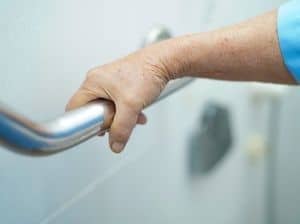
Our loved ones deserve the best in their golden years. They want to stay in the house that has become their home. It’s only natural, especially if they have lived in the same space for many years. However, the passing of time may mean their living space is no longer safe.
While retirement communities offer great safety features, your parents may not be ready for that move. It’s important to learn the top safety concerns for every senior to keep your loved ones out of harm’s way at their current home.
Common Home Hazards
Unfortunately, injuries at home are more common for our aging parents than we’d like to think. What safety concern pops into your mind first? You may have thought of your loved one experiencing a fall—a worry at the top of the list for every senior.
One fall can turn your aging parent’s life upside down, setting them back considerably in terms of independence. Injuries from falls may require surgeries and extensive rehabilitation with physical and occupational therapists.
Common home hazards that can lead to a fall include:
- A slip and fall in the bathroom
- Tripping over a rug or cord in the living room
- Walking around the house without a mobility aid
- Tripping in a poorly lit area
Ways To Improve Safety
Thinking of these common hazards leads to worries about your aging parent’s safety. Fortunately, there are ways to make a home senior-friendly. Let’s go over some tactics to help remedy the fall hazards mentioned above.
Bathroom Safety
Ideally, it would be best if you made the bathroom as safe for seniors as possible. Here are some important considerations for their well-being:
- Install grab bars so that they always have something to hold onto
- Replace the bathtub for a walk-in shower, complete with a shower chair
- Another alternative is a walk-in tub
- Ensure there is a non-slip mat in the following locations:
- In the shower or tub
- Outside the shower or tub
- Near the toilet and sink
Overall Home Safety
It’s important to also identify potential concerns that may be present in other areas of your parent’s house. For example, if they have a wood floor, ensure they always wear non-slip socks, slippers, or shoes when walking in their home. Socks on a wooden floor can result in a slip and fall.
Other best practices include having a well-lit home that’s free from tripping hazards. Mobility aids such as walkers and canes can be helpful for individuals who have become less balanced as they age. However, some seniors can be stubborn about making this switch, so be sure to discuss how these mobility aids can significantly reduce the risk of falls with your parent.
Returning Home After a Hospital Discharge
You should also consider improving a home’s safety after your parents return home from being in the hospital. You should familiarize yourself with tips to keep your loved one safe after a discharge. Consider using medical transport to bring your parent back home, as this will mitigate fall risks. You should also ensure their home is clean to prevent them from injuring themselves and being hospitalized again.
Your senior parents can still live at home, so long as it’s safe to do so. Take the time to identify potential hazards to reduce the chances of a fall.